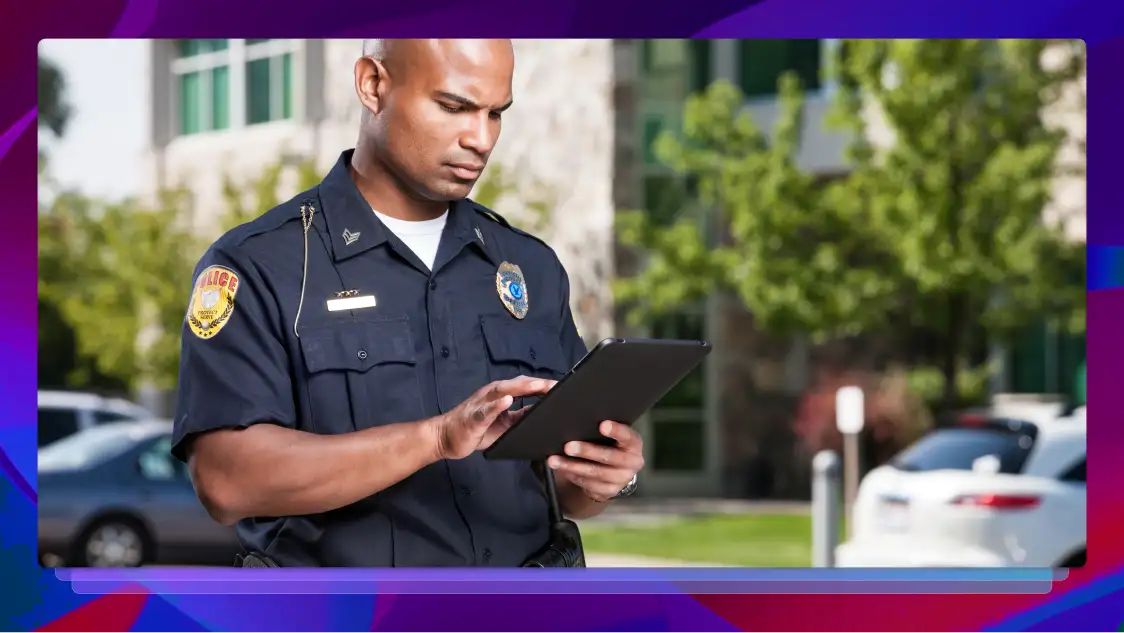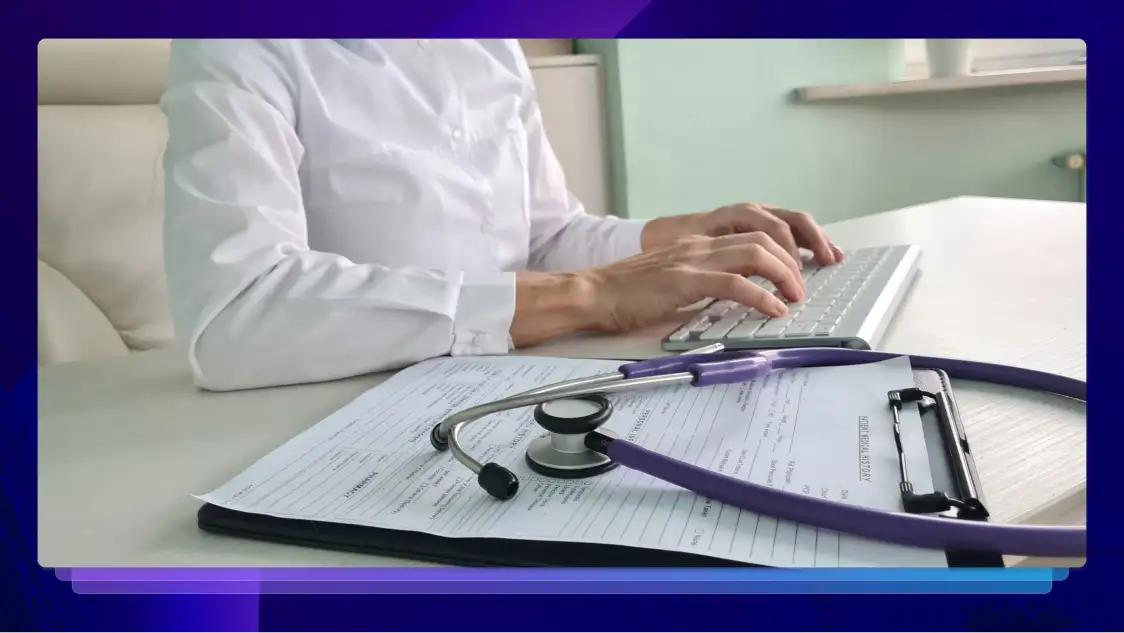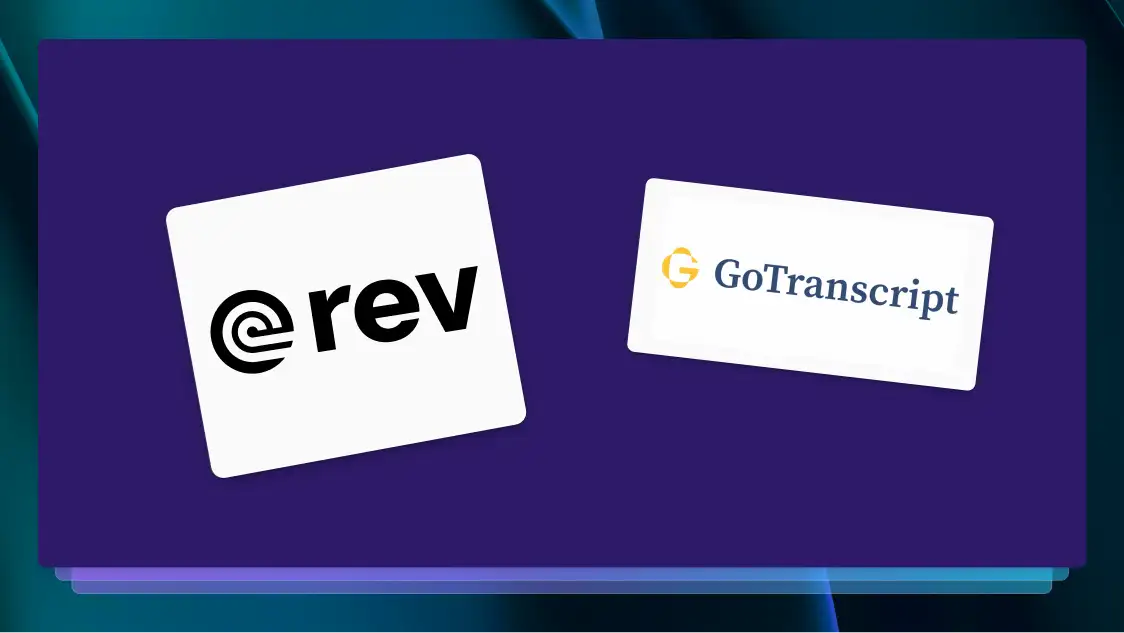Police Transcription: Abilities + Benefits For Law Enforcement
Police transcripts can provide necessary context, information, and evidence to law enforcement cases. Let’s look at what law enforcement transcription services are available and how to pick one.

Police body cameras have become a trending topic over the past few years. A body camera can give real-time updates about law enforcement’s activities, increasing safety, transparency, and accountability.
In some cases, a body camera video may be used as a training tool, a resource for a journalist, or even evidence in a courtroom. In those cases, a transcription of the audio can help those who need to reference what happened without having to watch and rewatch the video.
Let’s learn more about police transcription services and how to get police body cam footage from audio to the written word.
What Is Police Transcription?
Police transcription is the process of converting audio from law enforcement-related recordings like body cams, 911 calls, police scanners, and interviews into a written transcription that can be used for training, investigations, legal proceedings, and more.
Generating police transcripts is a good way to take some of the tedium out of sorting through the many police recordings that take place every day. For example, a Nuance study found that 56% of officers spend over three hours each shift on paperwork and general reporting that could be automated.
Since these recordings must be accurate and secure to be used as evidence and ensure public trust, getting a safe police transcription service is essential.
The Rise of Law Enforcement Recordings
As of 2023, 80% of police departments had started to use body-worn cameras for their police officers, and some states have started to pass laws requiring officers to wear them.
The rise of law enforcement recordings has correlated with a need for transparency, accountability, and reliability from law enforcement officials. In 2020, American trust in law enforcement dipped below 50% for the first time since Gallup started tracking that metric. Employing body cameras helps ensure that both law enforcement and citizens remain transparent and truthful throughout all interactions, which can help boost public trust.
Other types of recordings, like police scanners, interviews, and more, serve a similar purpose. They help ensure honesty throughout law enforcement interactions and can provide evidence or explanation of what occurred during an interaction if needed in a courtroom, training session, or performance review. And they help more than just officers get their job done.
"Having this type of media transcribed can really help ensure accuracy, eliminate some of the emotion from the process, and allow you take portions of the statements and attach them to a court document if needed," says Joselyn Sosa, Litigation Paralegal at Casey Gerry.
Challenges of Accurate Transcription
Sometimes law enforcement might find themselves in a high-pressure situation after an altercation or miscommunication, and may need a reliable transcription fast. It may be hard to generate an accurate and trustworthy police transcription quickly, which is just one of the reasons why law enforcement transcription services can step in to take some of the legwork out of it.
Some of the reasons why it may be difficult to capture good law enforcement recordings include:
- Security risks due to the sensitive nature of what is being discussed.
- Some transcription services can have a hard time understanding muffled voices or different accents.
- It can be time-consuming to manually sort through and transcribe a long video.
- Biases on either side can make it hard to transcribe objectively.
- Long-term storage for body camera footage can be costly.
How to Transcribe Police Footage
A good law enforcement transcriber will be objective, accurate, and fast. But that can be easier said than done when police officers are already stretched thin. However, you don’t always have to rely on manual transcription. That’s where transcription companies come into play.
Here are a few options for transcribing police audio:
1. Let Officers or In-House Workers Handle Transcription
If you need an interview, body cam, or police scanner transcription, you can task officers or other in-house employees with the task. Officers should know how to transcribe footage in case they need to get quotes or context for an interaction quickly, when there are no other options available. Because those who work within a law enforcement agency will have a better idea of the jargon used or scenarios present in a recording, they may be able to transcribe quickly and accurately.
However, law enforcement officers already have a lot on their plates. And likely, they don’t have a lot of time to devote to transcribing hours and hours worth of footage.
2. Outsource to AI
Artificial intelligence can be a great boon for many fields, including law enforcement. Outsourcing your recording needs to AI can make the work quicker and easier; typically, all you have to do is upload your footage to the AI transcription service and wait for the transcription to appear in your inbox. Although that's not to say that AI will overtake human judgement and oversight, rather it should be a assistant that helps move things along quicker.
In addition, AI may come with some security risks, such as digital attacks or vulnerability of digital files. You should always ensure that you’re working with a company that prioritizes secure and confidential storage of your data, including transcriptions.
3. Outsource to a Human or Hybrid Transcription Service
Hybrid services that combine the power of a human with the power of AI (like Rev!) provide the best of both worlds. Humans can ensure the transcriptions are accurate and secure, while AI can take some of the heavy lifting away and point out the most important insights and quotes from your recording.
And given how long law enforcement footage can be, having an AI assistant available to point out the most important learnings can be crucial. AI can help dig through the log of an hours-long transcription to find the most important parts. Just make sure that whatever service you choose is CJIS compliant for all case data you upload to the platform.
Benefits of Transcribing Bodycam Footage
Transcribing police body cam footage can help make sure law enforcement and citizens alike remain honest, transparent, and safe. By recording interactions between officers and civilians, there will always be a truthful resource to turn to or use as evidence in case things go awry.
What You Can Analyze With Transcripts
Law enforcement transcripts can provide much-needed context, evidence, and information that can be used in legal cases.
For example, a police scanner transcript can provide context about what law enforcement heard or saw when responding to a call; a transcribed interview can provide easy-to-access information about a case or suspect; and body cam footage transcripts can provide evidence about what occurred during an arrest or case.
With transcripts, you can analyze:
- Dialogue and interactions between law enforcement and civilians, lawyers, medical professionals, etc.
- An accurate and timed record of events for different scenarios in which law enforcement was involved.
- Police language with civilians, which has been proven to be a nationwide issue.
Where Transcription Is Used In Law Enforcement
Transcription is already widely used in law enforcement. This includes for:
- Police body camera footage
- Police vehicle dash camera footage
- Depositions
- Investigative reports
- Suspect and witness interviews
- Victim interviews
- Fire reports
- Inmate phone calls
- Recorded interrogations
- Recorded confessions
- Taped witness statements
- 911 dispatch communications
- Accident, arrest, and traffic reports
- In-Custody and Patrol Reports
As a whole, law enforcement transcription and police tech are on the rise across the country, and includes many devices outside the transcription space.
You Have the Right to Transcribe Footage
A legal transcription service like Rev can take some of the hard work off of a law enforcement worker’s ever-growing to-do list. Not only can we provide quick and accurate transcripts, our services are also secure and HIPPA compliant*, so you don’t need to worry about sensitive information being leaked or compromised.
Sign up for a free trial of Rev to see how it can help your law enforcement agency, then check out our plan options.
*HIPPA compliance is available for enterprise plans only.















